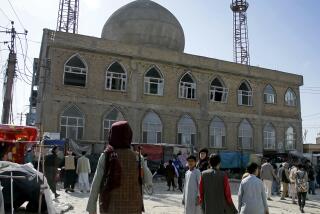Guantanamo documents may inflame U.S.-Pakistan tensions
- Share via
Reporting from Islamabad, Pakistan — Authorities at the U.S. detention center in Guantanamo Bay, Cuba, regarded Pakistan’s national intelligence agency, or ISI, as either involved in or supporting terrorism, according to leaked documents made public Monday, a designation that could anger leaders in the nuclear-armed Muslim country and worsen a relationship already marred by deep distrust.
Reports linking the ISI to terrorist groups and extremist organizations are nothing new. Just last week in a visit to Pakistan, Adm. Michael G. Mullen, chairman of the U.S. Joint Chiefs of Staff, bluntly raised the allegation that the ISI has ties to the Haqqani network, an Afghan Taliban wing. Pakistani army chief Gen. Ashfaq Kayani dismissed such accusations from the U.S. as “negative propaganda.”
But the latest disclosure, made in a new round of documents obtained and released by the website WikiLeaks that focuses on U.S. handling of detainees at Guantanamo Bay, comes at a time when relations between Washington and Islamabad are at one of their lowest points.
The September 2007 document, entitled “Matrix of Threat Indicators for Enemy Combatants,” lists the Inter-Services Intelligence directorate, Pakistan’s main intelligence agency, as one of 65 “terrorist and terrorist support entities.” The list, which also includes Al Qaeda, Hamas, Hezbollah and the Taliban, was drafted to help interrogators at Guantanamo determine a detainee’s linkage with terrorist organizations and what future threat the individual may pose.
“Through associations with these groups and organizations,” the document states, “a detainee may have provided support to Al Qaeda or the Taliban, or engaged in hostilities against U.S. or coalition forces.”
Pakistani intelligence officials refused to comment Monday on the document. The country’s intelligence community previously has denied any links with militant groups.
The ISI has been long said to have nurtured ties with Afghan mujahedin groups who years ago battled Soviet forces and later evolved into insurgents fighting U.S. and NATO forces in Afghanistan. The ISI also fostered the growth of militant groups fighting Indian troops in the disputed region of Kashmir — groups that have carried out terrorist strikes within Pakistan and coordinate with Al Qaeda.
The CIA has channeled hundreds of millions of dollars directly to the ISI since the Sept. 11, 2001, terrorist attacks, some of which is supposed to help pay for the capture or killing of Al Qaeda and Taliban militants.
The document was one of hundreds of Guantanamo detainee papers released to several U.S. and European media outlets. Some were posted Monday on the website of the Guardian, a British newspaper.
In recent months, there has been a near-freeze in cooperation between the CIA and the ISI, a conflict fueled largely by the case of Raymond Davis, the American who shot to death two Pakistani men in Lahore on Jan. 27. Davis has said the men were trying to rob him. Angered by the revelation that Davis was a CIA contractor, the ISI put joint operations with the CIA on hold and later demanded a sharp reduction in the number of the American intelligence agency’s operatives in Pakistan, as well as detailed information on the assignments of its remaining personnel.
Pakistani intelligence and military officials were further angered by a U.S. drone strike on March 17, the day after Davis’ release, which according to Pakistani authorities killed more than 40 civilians gathered at a tribal meeting in the volatile North Waziristan border region. The U.S. has maintained that only militants were killed in that strike.
U.S. frustration with Pakistan has centered on Washington’s long-held suspicions that the ISI provides support and sanctuary to the Haqqani network, believed responsible for many of the attacks on U.S. and North Atlantic Treaty Organization forces in eastern Afghanistan.
Among the documents disclosed by WikiLeaks was a report on the interrogation of Guantanamo detainee Harun Afghani, an Afghan militant who talked of direct support given by the ISI to militants fighting in Afghanistan in 2006. Afghani told interrogators that an ISI officer paid $11,700 to a militant who was transporting ammunition to a weapons depot operated by the Taliban and Al Qaeda.
Afghani also told interrogators about a meeting in August 2006 between Pakistani military and intelligence officials and commanders from Al Qaeda, the Taliban and the Pakistani militant group Lashkar-e-Taiba to discuss ratcheting up attacks in the provinces of Kapisa, Kunar, Laghman and Nangarhar in eastern Afghanistan.
More to Read
Sign up for Essential California
The most important California stories and recommendations in your inbox every morning.
You may occasionally receive promotional content from the Los Angeles Times.










